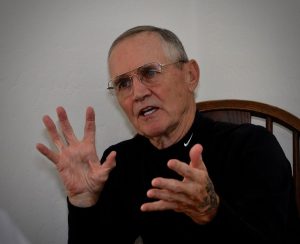KIDS
Political headlines remind of little kids who are desperate for approval and have never been told that bragging is obnoxious; and that lying, cheating and using other people’s money for self-serving outcomes are not ethical and moral. Where are the political leaders and leadership? They have been replaced by actors, entertainment and showmanship.
Directed mass communication and social media efforts to manipulate, discredit and dismantle; deliberate, vindictive attacks of media; election interference; politically inspired chaos, violence, distractions and divisiveness; loss of truth to power; deception and fake news intended to manipulate and nurture egos; emergence of fringe political organizations; and undermining international coalitions, these headlines portray boiling, turbulent, conflicted and partisan times. An analytical glance establishes the least common denominator to be nothing more than a manifestation of the reality of our individual and collective human condition—everything human can be reduced to entertainment that can be branded, that manifests competitive spirit and that can be marketed and sold as a commodity. Of notable interest in our Western culture has been the transition from politics with leaders and leadership to politics with politicians who are actors and entertainers who love showmanship and ego aggrandizement: a long-term, global worldview has been replaced by short-term entertainment snippets that are divisive and attract human ego’s thirst and greed. The glaring need is to grow leaders who are students of the human condition and leadership; and who have a track record of leadership successes with measureable accountabilities.
LEADERSHIP is an attribute of an individual’s brand; and is an earned, trust based, influence relationship between the respective leader, other leaders and followers who intend ethical and moral changes that mirror common purpose. Some key qualities for accountable leaders are as follows:
ETHICS: The practice of nurturing and evolving relationships in a spirit of caring, intelligence, heartfelt generosity, passionate aliveness, freedom and self expression. It is the art of being a good person and practicing goodness in everyday life. It includes all ways of being truthful, authentic and courageous that constitutes integrity: coupling intentions, promises and commitments with actions and behavior. Ethical persons “walk the talk” and model the way as individuals; in relationships; and when skillfully helping and supporting others. Good leaders provide clarity about institutional ethics, morals, values and principles and behave consistently with these organizational beliefs.
MORALS: Judgments made by an individual and concerned with the principles of right and wrong behavior and the goodness and badness of human character.
VALUES: Trust and trusted; integrity; direct; open; honest; caring; compassionate; moral authentic joy; hope; peace-of-mind.
PRINCIPLES: Does not lie, cheat or steal, nor tolerate those who do. Objective, not self-serving and acts in the best interests of the people and organization being served. Committed to the concept of 100% responsibility: life happens because of me and not to me. Does not blame others, learns from one’s own experiences in an intentional and self-directed manner and applies that learning to new challenges. Sets a good example for physical health, emotional balance, mental clarity, spiritual awakening, ethical behavior and integration of hidden, denied and repressed reflections manifested in the world.
INTEGRAL—comprehensive, whole, balanced, “best of the best”—VISION: Creates and communicates a world centric vision, strategies and direction for the organization and persons led. Articulates a worldview for the Nation and the globe and possesses an integral understanding that allows the leader to be aware and understand other persons thus opening greater mutual understanding and openness to innovative, harmonious resolution; and more intelligent and appropriate responses to conflicts faced.
MISSION DRIVEN: Peace-of-mind with purpose and connections built on a foundation of compassion. Has a bias for action, for trying new things and for getting things done. Aggressively pursues objectives and sets high standards for self and others. Takes calculated risks and makes personal sacrifices in order to get things done.
EXECUTIVE MATURITY: Acts appropriately in business, social and political situations. Displays control in complex, ambiguous or stressful situations. Identifies with persons, shares their values and beliefs and is comfortable with them. Works toward mutually carved-out, worldview goals.
HUMAN NEEDS SATISFACTION: Is “in-tune” with mental and emotional needs of others, cares about people and puts action plans in-place to create an environment to improve the quality of life and personal productivity that is beneficial for persons. Links recognition to accomplishment and shows appreciation and expresses pride in the team’s accomplishments.
INTEGRAL THEORY and PRACTICE: Student of integral theory and integral life practice that includes a pluralistic and multicultural composite map of the human territory and ways to include all of the important dimensions of being to enable growth, awakening and development to fullest capacities.
INTEGRAL COMMUNICATIONS and TECHNOLOGY MASTER: Integral communications translates the way an individual speaks to others’ perspectives while still being an authentic self. Simply keeps persons informed and creates communication forums and diverse coalitions to give and receive information and ethically manage perceptions. The spectrum of communication expertise: intrapersonal, interpersonal, person-to-persons, mass media, social media and associated technologies that optimize communication needs and strategies.
QUALITY RELATIONSHIPS and INFLUENCE: Develops, uses and sustains strong, cooperative relationships with persons. Uses effective listening and interpersonal skills to achieve mutual trust and respect. Accomplishes tasks and objectives by resolving conflicts and influencing the actions of others. Is seen as a change agent; and makes a difference when involved.
STAFFING and STAFF DEVELOPMENT: Attracts and selects people with innate talents and learned skills. Assesses the short and long-term needs of the institution and develops plans to improve the overall structure and talent and skills strength of the institution.
TEAM LEADERSHIP: Achieves results by motivating and inspiring a unified, winning team. Builds commitment to common goals by communicating a sense of mission and by energizing the team. Creates an environment where differences are valued, where systems work equally well for all and wherein persons can retain their uniqueness and contribute at their full potential.
BUSINESS and FINANCIAL SAVY: Has a worldview perspective and is aware and understands the implications of changes in the globe. Has “street smarts,” sizes-up situations quickly, is practical, and knows the right things to do and when to do them. Plans, communicates, monitors and controls, establishes risks, solves problems and makes sound decisions concerning economic and financial performance.
HANDLING COMPLEXITY: Analyzes and solves complex problems. Deals effectively with large amounts of data, changing conditions, incomplete data or uncertainty. Understands how seemingly unrelated issues interact and affect one another. Gets to the essence of complex issues quickly, generates a variety of alternative courses of action and makes effective decisions.
IDEA LEADERSHIP: Open to input, change and new ideas. Implements breakthrough and innovative ideas, programs and processes that make a genuine difference.
INTEGRAL POLITICS: is aware and understands the inadequacies of political parties because of limited and partial views that do not address the complex issues facing the world today.
Individuals matter, leaders matter and leadership matters. If democracy is to prevail, we must select good leaders and hold them accountable for high quality leadership!! The evolution imperative of wholeness and inspired, growing awareness of the human condition, coupled with helping others, can change the daily headlines from an underlying sense of fear, chaos and domination to love and freedom. Leaders can be grown who create a vibrant civil society where people continue to be free, to live as they choose, to speak their minds, to organize peacefully and to have a say in how they are governed.


